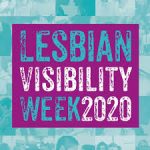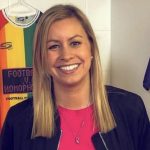Jo Currie: Lesbian visibility matters in sports media
As BBC Women’s Sport Reporter, Jo Currie is a familiar face in the media to millions. She wants young LGBT+ journalists to know it’s OK to be out…
By Zoe Vicarage – @ZoeVicarage

The first-ever Lesbian Visibility Week is drawing towards a close, concluding in Lesbian Visibility Day itself – an awareness initiative that began back in 2008.
Here at Sports Media LGBT+, we’ve seen an increase in the number of visible LGBT+ women in key roles in the industry, as well as sportswomen being their authentic selves and sharing their stories.

I caught up with BBC Women’s Sport Reporter and network member Jo Currie to get her thoughts on recognising women-loving women in the LGBT+ community, being visible in her role, and lots more in an in-depth Q&A…
Jo, thank you for talking to us in Lesbian Visibility Week. How important is this as an awareness initiative?
It’s so important. It not only gives gay and bisexual women an opportunity to celebrate but more significantly, it’s an opportunity to share stories, give advice, and support each other.
With everything that’s gone on this year – I appreciate the week’s probably not being celebrated how the organisers originally planned – there are going to be gay and bisexual women sat at home on their own and more than ever, it’s important for them to know they’re part of a community.
This week is important, not for those who work in broadcasting, but for those who feel they still have to hide their true selves and those who don’t want to come out. It’s a way of saying to them they’re not alone and that there are plenty of us out there.
Why is it important to you personally?
I work in sport and I love sports broadcasting – it’s a wonderful career to be in and I wouldn’t change it for anything. It’s not always easy and some areas are certainly tougher than others.
I don’t think there’s any young reporter who has walked into a Premier League press conference having to ask questions and not been nervous. You throw in the fact that you might be a young, gay female reporter… when you look around that press conference room, you are mostly going to be surrounded – when it comes to football – by white, straight, middle-aged men.
There are certainly more women in football than ever before but there aren’t a large number of gay women working as journalists or reporters. If I can say to any young female journalist who is gay or bisexual and at the start of her career, realise you are not on your own. There might not be that many of us visible to you but you can succeed in this industry and you shouldn’t let it be a barrier to hold you back.
Working for the BBC and focusing on women’s sport, they’ve given you the platform to tell LGBT+ stories. How important has that been?
I feel very fortunate to work for the BBC and I’ve always found it to be an inclusive place to work as a gay woman, as well as in our approach to stories we cover. We have a responsibility to cover stories that are about every area of society, whether that’s race, sexuality, or disability.
When I’ve gone to bosses to discuss stories about gay or bisexual women, they are very well received. I recently did an interview with two England Women cricketers – Natalie Sciver and Katherine Brunt – about the fact that they had got engaged. I remember asking them ‘why have you felt the need to come out and why now?’
It was such a great answer they gave me. They said they wanted to help young gay women and tell them that they can be themselves and you can love who you love. It was such a pleasure to do that interview.
It’s so important that we do tell those stories because there are young people out there who haven’t come out and are scared to.
Yes, my job is Women’s Sport Reporter, and there are a large number of gay women working in sport, in terms of athletes. It doesn’t always have to be part of the story but I think it’s important we use guests that cover a range of people. It’s about getting those who are open to being visible, even if they’re not talking about their sexuality in that story.
Have you noticed an increase in the amount of LGBT+ stories you’ve been able to tell?
I’d say we do more because there are more female athletes who are out these days. It’s no longer such a big taboo.
I remember when Casey Stoney came out in 2014 – she was England captain at the time. For an England football captain to come out as gay, it was huge and brave. I think it set the precedent, particularly in women’s football, that it’s absolutely fine.
What I find now, not just in football but across women’s sport, is that there are a lot of gay athletes. While they don’t feel they need to do big sit-down interviews about it, if you follow them on Instagram you’ll automatically know who their girlfriend is.
There are so many more athletes who are open about it. They’re not talking about it in every interview but it’s part of their life and they, therefore, want to make it public. That makes it easier for us if we’re trying to find a range of different guests.
We probably do more stories but I think it’s more about the fact that it’s far more accepted these days than even five years ago.
Do you feel there are more role models for young, lesbian sports journalists coming through?
Role models are always important. There are more women working in sport than ever before and there are more gay women. I don’t think there are a huge amount of us who are out but again, that’s why I feel it’s important for me to say to other people, ‘this is me, I’m OK with it and it’s fully accepted’.
When I started off in this industry, the only person for me who was out was Clare Balding. I just think it’s time that there are more of us. The likes of Jane Hill (BBC News journalist and presenter) coming out and being a big part of Lesbian Visibility Week is wonderful, as she’s talked quite publicly about her difficulty of not coming out until her 30s because she didn’t see where she fitted into society.
What do you think Sports Media LGBT+ can do to help more people going forward?
The organisation does a wonderful job. I know of more gay people working in sport than ever before because of this network. You publicise and highlight people’s stories and their careers. Just keep doing what you do.
Getting a project like this off the ground is never easy and it’ll keep getting bigger and bigger. It’ll help so many people working in the industry and keep bringing people together.
What can the media industry do better to make both their workplaces and their content more inclusive?
The BBC’s newsroom is more inclusive than ever. The wider industry needs to commit more to their newsrooms to reflect society better, as it would help to change the news agenda.
Thanks so much to Jo for her time. Follow her on Twitter at @JoCurrie and on Instagram at @jocurrietv.
Further reading…
Lesbian Visibility Week: Support and celebrate
Women in sports media share stories for Lesbian Visibility Day


